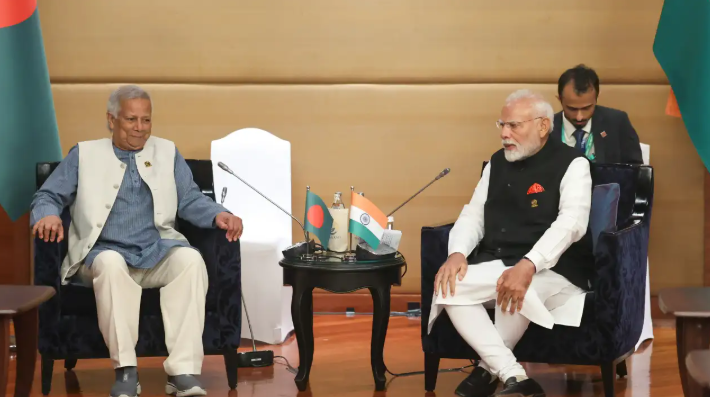In a recent interview with BBC Bangla, Yunus acknowledged that restoring functional bilateral ties with India was crucial for Bangladesh. He stated that the two nations remain ‘historically, politically, and economically’ connected and that their relationship is ‘fundamentally strong’.

New Delhi’s withdrawal of the trans-shipment facility it had granted to Bangladesh for exporting various items to the Middle East, Europe and various other countries except Nepal and Bhutan has hit Dhaka hard. The move came in wake of the increasingly ‘anti-India stance’ of the Muhammad Yunus-led interim government. The Foreign Ministry, however, said the privilege offered to Dhaka was withdrawn as it begun causing significant operational issues at Indian ports and airports
Among the worst affected by the withdrawal of the trans-shipment facility is the Bangladesh garment exporters, who had been reeling under huge stress due to global demand. “Primarily, finished branded ready-made garments were entering India for air transport to Europe and the US from Delhi and Mumbai airports. Bangladeshi exporters used air freight for high-value cargo to ensure faster delivery to clients. Traditional sea freight often involves delays due to congestion,” PCASWA secretary Kartik Chakraborty said told news agency PTI.
Transshipment cargo from Bangladesh for re-export through India grew by 46 per cent between the 2023-24 and 2024-25 fiscals at the Petrapole Land Port in West Bengal’s North 24 Parganas district, according to official data.
New Delhi’s move is seen as retaliation against the increasingly “anti-India stance” of the Muhammed Yunus-led interim government.
During his recent four-day trip to China, Yunuus described India’s Northeast as a “landlocked” region reliant on Dhaka for access to the ocean — remarks that triggered strong diplomatic backlash.
In a sharp rebuttal to Yunus, External Affairs Minister S Jaishankar highlighted the role of India’s cast 6,500-km coastline and its geographical linkages with five Bay of Bengal Initiative for Multi-Sectoral Technical and Economic Cooperation (BIMSTEC) members.
“India shares borders not only with five BIMSTEC members, connects most of them, but also provides much of the interface between the Indian sub-continent and ASEAN. Our North-Eastern region in particular is emerging as a connectivity hub for the BIMSTEC, with a myriad network of roads, railways, waterways, grids and pipelines,” Jaishankar said in a statement.
India Is Among 15 Sources Of FDI For Bangladesh
India is Bangladesh’s second-largest trading partner, and a foremost development partner with a development portfolio of US $8 billion. Dhaka relies substantially on foreign funds for its development and sustenance. However, amid increasing anti-India sentiment, trade has declined due to border closures, customs clearance issues, and increased security surveillance hindering the smooth flow of goods between the two countries.
Apart from that, several projects aimed to boost connectivity between both countries have also been put on hold, and public transportation has remained suspended since last June. This has not only led to losses for traders sending goods across the border, but has also created challenges for Bangladeshis looking for medical treatment in India.
India-Bangladesh Relations and the Pakistan Wildcard
While Yunus has publicly reassured that “there is no problem in our basic relationship (with India),” his government has repeatedly blamed India for the domestic chaos in Dhaka to shift responsibility.
Breaking the Awami League’s Hilsa diplomacy, Farida Akhter, the Yunus government prohibited the sale of Hilsa to India ahead of the Durga Puja, stating that there would not be enough for the domestic population. This decision – which appeased anti-India sentiments in Bangladesh – affected Hindu celebrations across the border, raising doubts over the interim government’s commitment to protecting the rights of its Hindu minorities.









